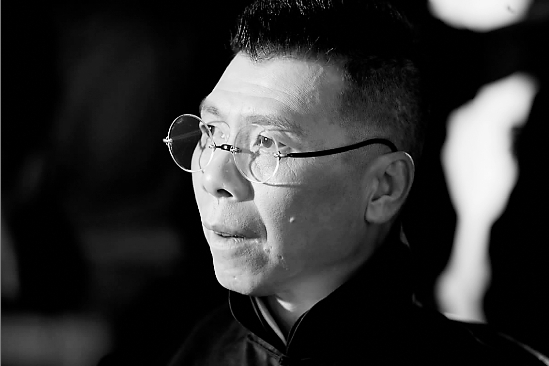China's Woody Allen - Feng Xiaogang
中國(guó)的伍迪·艾倫——馮小剛
Film director Feng Xiaogang may have made China's biggest box office hit, the disaster movie, "Aftershock", but he built his reputation in comedies, comparing himself to American director, Woody Allen.
電影導(dǎo)演馮小剛執(zhí)導(dǎo)的災(zāi)難片《唐山大地震》在中國(guó)獲得了巨大的票房成功,但是,奠定這位自比美國(guó)導(dǎo)演伍迪·艾倫的中國(guó)導(dǎo)演的影視地位的,卻是因?yàn)橄矂 ?/p>

"I wasn' t sure what kind of comedy to do. I didn't think I'd be any good at doing Jim Carrey kind of slapstick comedies. I'm more like Woody Allen."
"以前,我不是特別清楚各種類型的喜劇作品該怎樣執(zhí)導(dǎo)。我只是認(rèn)為,我并不擅長(zhǎng)金·凱瑞似的打鬧風(fēng)格喜劇。我的影片更像是伍迪·艾倫的風(fēng)格。"
His "Annie Hall" moment came with 2001 comedy "Big Shot's Funeral" that featured Donald Sutherland and gained international recognition.
在2001年,由馮小剛執(zhí)導(dǎo)的喜劇電影《大腕》,同由唐納德·蘇德蘭主演的伍迪·艾倫的作品《安妮·霍爾》一樣,獲得了國(guó)際認(rèn)可。
But last year's "Aftershock" has elevated the 53-year-old to the position of the most bankable director in China.
但是去年的《唐山大地震》的成功,讓已53歲的的馮小剛一躍成為中國(guó)最有票房號(hào)召力的導(dǎo)演。
It took over $147 million at the box office in China making it the highest grossing film in the country' s history. It will also be China's official entry into the Academy Awards this year.
在中國(guó),《唐山大地震》總票房收入超過(guò)了1億47100萬(wàn)美元,這創(chuàng)下了中國(guó)電影的最高歷史紀(jì)錄。同樣,該片還將成為今年中國(guó)角逐奧斯卡大獎(jiǎng)的官方作品。
The film is based on the devastating earthquake of 1976 that killed thousands in the city of Tangshang, northeast of Beijing.
電影以真實(shí)發(fā)生在1976年的一場(chǎng)毀滅性的地震為依據(jù),那場(chǎng)地震奪去了位于北京東北部唐山市上萬(wàn)人的生命。
"I knew from the very beginning that this will become a film that would attract a big Chinese audience. It's a collective memory for everyone here in China so I knew the movie would touch everyone... This movie is also very relevant to many people's daily lives," he said.
馮小剛坦言我從一開(kāi)始就知道這將是一部會(huì)吸引大部分中國(guó)觀眾注意力的電影。這是生活在中國(guó)這塊土地上的人的集體記憶,因此我知道,這部電影會(huì)感動(dòng)每一個(gè)人……而且,這部電影與很多人的日常生活有著密切聯(lián)系。"他說(shuō)。
Feng's screen career began in television, directing and occasionally acting, before moving into filmmaking. He tested the limits of the censors along the way. "We walk a very tight rope, we have to strike balance otherwise we' re going to fall," he said about censors in China. "Some of my earlier films might have been a little too edgy for a mainstream audience, at least that what the censors thought."
在開(kāi)始進(jìn)行電影制作以前,馮小剛的影視事業(yè)還是起步于導(dǎo)演以及偶爾客串電視劇。一路走來(lái),他接受了審查員們最為嚴(yán)格的審查。在談及中國(guó)的審查員時(shí),馮小剛說(shuō):"我們就像行走在一根緊繃的繩子上,我們不得不努力保持平衡,否則,就會(huì)掉下去。""對(duì)主流觀眾來(lái)說(shuō),我早期的一些電影或許有-點(diǎn)兒太激進(jìn)了,至少審查員們是這么認(rèn)為的。"
One of Feng' s targets in his earlier films has been commercialism. including "Big Shot's Funeral" where a film director sells his funeral to advertisers.
馮小剛早期的電影的一大主題是商業(yè)主義,包括《大腕》在這部電影里,一位導(dǎo)演將自己的葬禮推銷給了廣告商。
However some have criticized Feng for becoming too commercial in his own filmmaking. especially with overt product placement in ..Aftershock".
但是,已經(jīng)有人批評(píng)起馮小剛在電影制作上太過(guò)商業(yè)化,尤其是《唐山大地震》中明顯的植入式廣告。
In response he told Xinhua News that product placement will be an increasingly important part of the Chinese film.
作為回應(yīng),他在《新華社》上發(fā)表評(píng)論說(shuō),植入式廣告將逐漸地成為中國(guó)電影的重要組成部分。
He prides himself on having the common touch to attract big audiences.
對(duì)于自己擁有平易近人的品質(zhì)從而能吸引大量觀眾這一點(diǎn),他為自己感到驕傲。
"The biggest advantage is that I know what audiences want... of course not all of them. but at least I know what most of them want." he said.
"我最大的優(yōu)勢(shì)是,我了解觀眾們的需要……當(dāng)然,不能說(shuō)是所有的觀眾,但至少我了解大部分觀眾的需要。"他說(shuō)。
"I don't think that the audience is God. Nor do I think we are above them. I just think that we are on a level playing field."
"我覺(jué)得,觀眾不是上帝,我們也不是高高在上。我只是覺(jué)得,我們都身處在一個(gè)公平競(jìng)爭(zhēng)的環(huán)境。"


